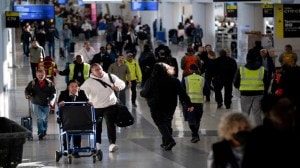Covid-19: Covid-19 outbreak was one of the deadliest pandemic that the world went through in the past few years. People who suffered from Covid-19 infection faced issues such as severe hair fall, loss of taste and loss of smell along with other complications.
However, a new study has put forward an experimental treatment for people who have a persistent loss of smell from Covid-19.
At the upcoming annual meeting of the Radiological Society of North America (RSNA), a set to be presented research suggests a potential breakthrough in reviving the sense of smell among long-Covid patients via a minimally invasive procedure.
Parosmia, identified as a malfunction in the sense of smell, has become a documented symptom of Covid-19, impacting around 60 per cent of affected individuals.
Although many people eventually regain their sense of smell, a subset of long-Covid patients grapple with these symptoms persisting for several months or even years, leading to a significant impact on their appetite and overall well-being.
A professor of musculoskeletal radiology at Jefferson Health in Philadelphia and the lead author of the study, Dr Adam C. Zoga has noted the increasing recognition of post-Covid parosmia and its impact on patients.
According to him, patients can develop a distaste for foods and drinks that were previously enjoyed by them.
In addition to experiencing a distorted sense of smell, certain individuals also contend with phantosmia, a condition characterized by the perception of odors—whether unpleasant or pleasant—that do not exist in their immediate environment.
Researchers are emphasizing their attention to the benefits of CT-guided stellate ganglion block in order to have a potential treatment for long-term post-COVID parosmia.
The stellate ganglia, a component of the autonomic nervous system located on either side of the neck, play a pivotal role in relaying specific signals to areas such as the head, neck, arms, and the upper portion of the chest.
In their study, the research team implemented a stellate ganglion block, a procedure entailing the direct administration of an anesthetic into the stellate ganglion on one side of the neck. This intervention aims to activate the regional autonomic nervous system.
The minimally invasive procedure lasts less than 10 minutes and requires no sedation or intravenous analgesia. This procedure has also been used for other varying conditions such as cluster headaches, phantom limb pain, and cardiac arrhythmia and had varying success.
Among 54 patients enduring post-COVID parosmia persisting for over six months, 65% underwent follow-up. After receiving the injection, 59% reported symptom improvement within one week, escalating to 82% experiencing significant progressive enhancement by the first month. Notably, these patients exhibited an average 49% improvement in symptoms at the three-month mark.
Dr. Zoga emphasized the injection’s success, noting, “Previous treatments have been ineffective. This injection is proving effective.”
This procedure exhibits promise in alleviating persistent parosmia in long-Covid patients, potentially serving as a viable approach to enhance their overall quality of life.









